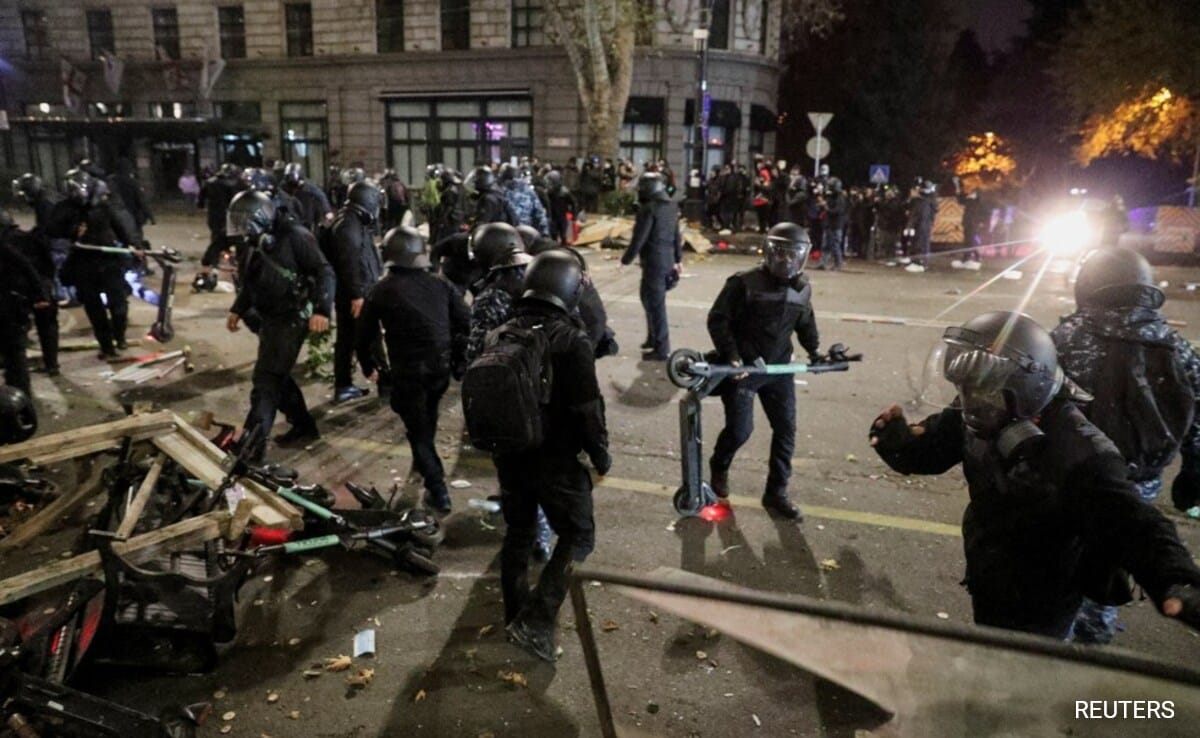2024-12-01 14:36:03

Tiblisi:
Facing condemnation from the United States and defiance from his own president, Georgian Prime Minister Irakli Kobakhidze praised police on Sunday for cracking down on protesters who he said were acting on foreign orders to undermine the state.
Georgia, a country of 3.7 million people that was once part of the Soviet Union, has been plunged into crisis since the governing Georgian Dream party said on Thursday it was halting European Union accession talks for the next four years.
The EU and the United States are alarmed by what they see as Georgia’s shift away from a pro-Western path and back towards Russia’s orbit. Big anti-government protests have taken place in the capital Tbilisi for the past three nights, and police have fired water cannon and tear gas into the crowds.
More protests are planned in Tbilisi for Sunday night, and local media reported demonstrations were taking place in towns and cities throughout the country.
Russian security official Dmitry Medvedev said on Sunday that an attempted revolution was taking place in Georgia. The former Russian president said on Telegram that Georgia was “moving rapidly along the Ukrainian path, into the dark abyss. Usually this sort of thing ends very badly”.
Medvedev, once seen as a modernising reformer, has reinvented himself as an aggressive hawk since Russia’s full-scale invasion of Ukraine, often hurling dire warnings at Kyiv and its Western supporters.
The Kremlin has yet to comment on the latest events in Georgia, but it has long accused the West of fomenting revolutions in post-Soviet countries that Moscow still regards as part of its sphere of influence.
‘FOREIGN INSTRUCTORS’
Georgian Prime Minister Kobakhidze dismissed criticism by the United States, which has condemned the use of “excessive force” against demonstrators.
“Despite the heaviest systematic violence applied yesterday by the violent groups and their foreign instructors, the police acted at a higher standard than the American and European ones and successfully protected the state from another attempt to violate the constitutional order,” he told a press conference, without providing evidence of foreign involvement.
Kobakhidze also shrugged off Washington’s announcement on Saturday that it was suspending its strategic partnership with Georgia. He said this was a “temporary event”, and Georgia would talk to the new administration of President-elect Donald Trump when it takes office in January.
Deepening the constitutional crisis in the country, outgoing President Salome Zourabichvili – a critic of the government and a strong advocate of Georgian membership of the EU – said on Saturday that she would refuse to step down when her term ends later this month.
Zourabichvili said she would stay in office because the new parliament – chosen in October in elections that the opposition says were rigged – was illegitimate and had no authority to name her successor.
Kobakhidze said he understood Zourabichvili’s “emotional state”.
“But of course on December 29 she will have to leave her residence and surrender this building to a legitimately elected president,” he said.
Georgian Dream has nominated Mikheil Kavelashvili, a former soccer star with a record of hardline, anti-Western statements, as its candidate for president. The head of state will be chosen on Dec. 14 by an electoral college consisting of members of parliament and local government representatives.
‘FOREIGN AGENTS’
For much of the period since the 1991 collapse of the Soviet Union, Georgia has leaned strongly towards the West and tried to loosen the influence of Russia, to which it lost a brief war in 2008. It has been promised eventual NATO membership, and became an official candidate for EU entry last year.
But domestic opponents and Western governments have become alarmed by what they see as increasingly authoritarian and pro-Russian tendencies by the Georgian Dream government.
In June, it enacted a law obliging NGOs to register as “foreign agents” if they received more than 20% of their funding from abroad. In September, parliament approved a law curbing LGBT rights.
The government says it is acting to protect the country from foreign interference and avoid suffering the fate of Ukraine by being dragged into a new war with Russia.
New EU foreign policy chief Kaja Kallas voiced solidarity on Sunday with the demonstrators.
“We stand with the Georgian people and their choice for a European future,” she posted on X.
“We condemn the violence against protesters & regret signals from ruling party not to pursue Georgia’s path to EU and democratic backsliding of the country. This will have direct consequences from EU side.”
(This story has not been edited by NDTV staff and is auto-generated from a syndicated feed.)
Georgia Protest,Georgia EU membership protest,european union membership,Georgia European Union membership
Source link
1 total views , 1 views today
